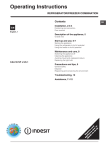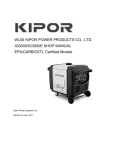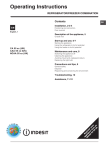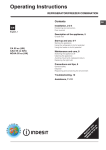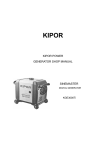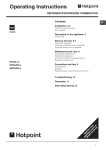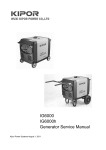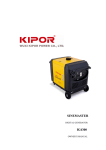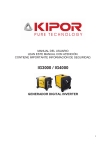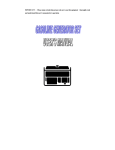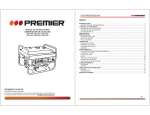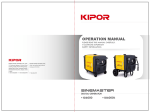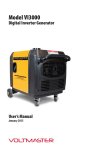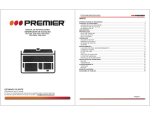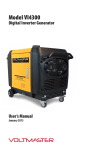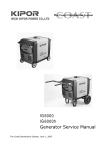Download IG4300 Service Manual - Kipor Power Equipment
Transcript
WUXI KIPOR POWER PRODUCTS CO., LTD. er S ys te m In s, EPA/CARB/CETL Certified Models c. IG4300 SHOP MANUAL ow po rP Ki 11 © 20 Kipor Power Systems, Inc. July, 2011 Preface This manual covers the construction, function and servicing procedure for the Kipor IG4300 generator. It is applicable to EPA, CARB, and CETL certified models. Careful observance of the instructions contained in this manual will result in safe and quality service work. All information, illustrations, directions and specifications included in this publication are based on the latest product information available at the time of approval for printing. In c. WUXI KIPOR POWER CO., LTD, reserves the right to make changes without incurring any obligation whatever. © 20 11 Ki po rP ow er S ys te m s, No part of this publication may be reproduced without written permission. CONTENTS PREFACE .................................................................................................................... i. CONTENTS ................................................................................................................. 1 © 20 11 Ki po rP ow er S ys te m s, In c. 1. SPECIFICATIONS/WIRING DIAGRAM ................................................................... 3 1.1 SPECIFICATIONS............................................................................................ 3 1.2 PERFORMANCE CHARACTERISTICS........................................................... 4 1.3 PERFORMANCE CURVES.............................................................................. 6 1.4 DIMENSIONAL DRAWING .............................................................................. 7 1.5 WIRING DIAGRAM .......................................................................................... 8 2. SERVICE INFORMATION ....................................................................................... 9 2.1 THE IMPORTANCE OF PROPER SERVICING ............................................... 9 2.2 IMPORTANT SAFETY PRECAUTIONS ........................................................... 9 2.3 SERVICE RULES........................................................................................... 10 2.4 ELECTRICAL PRECAUTIONS ...................................................................... 10 2.5 SERIAL NUMBER LOCATION ....................................................................... 11 2.6 MAINTENANCE STANDARDS ...................................................................... 12 2.7 TORQUE VALUES ......................................................................................... 14 3. TROUBLESHOOTING........................................................................................... 15 3.1 GENERAL SYMPTOMS AND CAUSES ......................................................... 15 3.2 HARD STARTING .......................................................................................... 16 3.3 IGNITION SYSTEM FAULT ............................................................................ 17 3.4 OIL SWITCH DEFECTIVE ............................................................................. 19 3.5 ENGINE WON’T STAY RUNNING ................................................................. 19 3.6 ENGINE SPEED DOES NOT STABILIZE ...................................................... 20 3.7 SMART THROTTLE PROBLEMS .................................................................. 20 3.8 LOW OR NO AC OUTPUT ............................................................................. 21 3.9 NO DC OUTPUT ............................................................................................ 22 3.10 NO ELECTRIC START ................................................................................. 22 3.11 BATTERY WON’T CHARGE OR HOLD A CHARGE .................................... 23 4. MAINTENANCE ................................................................................................... 24 4.1 MAINTENANCE SCHEDULE ......................................................................... 24 4.2 ENGINE OIL ................................................................................................... 24 4.3 LOW ENGINE OIL ALARM INSPECTION ...................................................... 26 4.4 AIR FILTER .................................................................................................... 27 4.5 SPARK PLUG................................................................................................. 28 4.6 VALVE CLEARANCE ..................................................................................... 29 4.7 FUEL FILTER AND FUEL SWITCH ................................................................ 31 5. AIR FILTER AND MUFFLER ................................................................................ 32 5.1 AIR FILTER .................................................................................................... 32 5.2 MUFFLER ...................................................................................................... 32 5.3 EXHAUST TUBE/SECONDARY AIR INJECTION VALVE .............................. 33 1 © 20 11 Ki po rP ow er S ys te m s, In c. 6. CARBURETOR .................................................................................................. 34 6.1 CARBURETOR REMOVAL AND REINSTALLATION ..................................... 34 6.2 STEPPING MOTOR DISASSEMBLY AND REASSEMBLY ............................ 35 6.3 CARBURETOR DISASSEMBLY AND REASSEMBLY ................................... 36 6.4 FLOAT AND STEPPING MOTOR INSPECTION ........................................... 37 7. CONTROL PANEL COMPONENTS .................................................................... 39 7.1 DISASSEMBLY AND REASSEMBLY ............................................................. 39 7.2 AC RECEPTACLES ....................................................................................... 39 7.3 DC RECEPTACLES ....................................................................................... 39 7.4 SMART THROTTLE SWITCH ........................................................................ 39 7.5 IGNITION MODULE ....................................................................................... 40 7.6 IGNITION SWITCH ........................................................................................ 40 7.7 BRIDGE RECTIFIER...................................................................................... 41 7.8 CURRENT LIMITER ....................................................................................... 41 7.9 CHARGE REGULATOR ................................................................................. 42 7.10 TIMING RELAY ............................................................................................ 43 7.11 DIGITAL DISPLAY PANEL ............................................................................ 43 8. HOUSING AND FUEL TANK ............................................................................... 44 8.1 DISASSEMBLY AND REASSEMBLY ............................................................. 44 8.2 VAPOR CONTROL SYSTEM ......................................................................... 45 9. RECOIL STARTER/AIR CONDUCT COVER ....................................................... 46 9.1 DISASSEMBLY AND REASSEMBLY ............................................................. 46 9.2 RECOIL STARTER INSPECTION AND ASSEMBLY ...................................... 47 10. ALTERNATOR/TRIGGER/IGNITION COIL/ELECTRIC STARTER .................. 50 10.1 ALTERNATOR .............................................................................................. 50 10.2 IGNITION COIL AND TRIGGER .................................................................. 52 10.3 STARTER MOTOR....................................................................................... 55 11. VALVE COVER AND CYLINDER HEAD .............................................................. 56 11.1 VALVE COVER DISASSEMBLY/REASSEMBLY .......................................... 56 11.2 CYLINDER HEAD ASSEMBLHY .................................................................. 57 11.3 INSPECTION................................................................................................ 58 12. CRANKCASE/ CRANKSHAFT/CAMSHAFT/ PISTON ........................................ 61 12.1 CRANKCASE COVER ................................................................................. 61 12.2 CRANKSHAFT AND CAMSHAFT ................................................................ 62 12.3 PISTON AND CONNECTING ROD.............................................................. 63 12.4 INSPECTION ............................................................................................... 64 2 ______________________________________________________________________ 1. SPECIFICATIONS 1.1 SPECIFICATIONS Dimensions and weight IG4300 30.9 (785) Width in (mm) 18.5 (470) Height in (mm) 22.4 (570) In Length in (mm) c. Model 165 (75) s, Net weight lbs (mm) ys te m Engine KG280GETi Type single cylinder,air-cooled,4-stroke,overhead valve Displacement(cc) 277 Bore x stroke (mm) 78×58 mm 8.5:1 Cooling system Forced air 11 Ki Compression ratio © Spark plug T.C.I 20 Ignition system Ignition timing ow po rP Max Power(KW)/rpm 5.5/3600 er S Model 25 B.T.D.C WR7DC Carburetor Float type, horizontal butterfly valve Air filter Semi-dry Governor Electronic control Lubrication system Splash Oil capacity 1.2 qt 1.1L Starting system Recoil and electrical starter Stopping system Electronic ground 3 Fuel used Automotive unleaded gasoline Alternator KD38 Generator type Multi pole rotation type Generator structure Self-ventilating drip-proof type Excitation Self-excitation (Magnet type) Voltage regulation system PWM(Pulse width modulation) Phase Single phase Rotating direction Clockwise (Viewed from the generator) Frequency regulation Inverter- quartz movement ys te er S 1.2 Performance Specifications ow Model po rP Maximum output (AC) Rated output (AC) 4.3 KVA 12V 60 Hz 11 Rated Frequency IG4300 4.0 KVA Ki Rated output (DC) m s, In c. Model 120/240V Rated Voltage(DC) 12V © 20 Rated Voltage(AC) Max Current (AC) 35.8/17.9 Rated Current(AC) 33.3/16.7 Rated Current(DC) 5A Power factor cosφ 1.0 Voltage variation rate Momentary Average Average time max 10% max 1.5% max 3 sec Voltage stability ±1% 4 Frequency variation Momentary Average Average time rate 1%max. 1%max. 1 sec. max. Frequency stability ±0.1% 10MΩ min. AC circuit protector 120V-35.8A 240V-18.5A DC circuit protector 5.1 A Fuel tank capacity 13L Fuel Consumption g/KW.h (Rated Load) Continuous Running Time (Rated Load) Noise level dB(A)/7M (None load~Full load) s, m 5 In 374 © 20 11 Ki po rP ow er S ys te 65~70 5 c. Insulation resistance 1.3 Performance curves The curves show performance of the generator under average conditions. Performance may vary to some degree depending on ambient temperature and humidity. The output voltage will be higher than usual when the generator is still cold immediately after the engine starts. c. 120 6 20 25 m 3 15 er S 230 9 12 15 11 0 po rP ow 240 20 电流(A) Curren A 10 © AC output voltage 交 流 输 出 电 压 (V) 5 ys te Current ( A) 0 s, In 110 Ki AC output voltage AC external characteristic curve 6 1.4 Dimensional drawings © 20 11 Ki (with wheel kit installed) po rP ow er S ys te m s, In c. Unit: mm 7 IG4300 Red Red Red Black 12 4 Blue Blue Brown Brown 7 1 9 2 5 Current Transformer In s, Inverter Black Black m Black Stepper Motor Black White Brown er S Blue Pink Red 12 4 8 Red L5-30 Black rP Working Indicator Red Green Overload Indicator Purple Blue Grey Low Oil Alarm 11 20 Blue Charging Winding Blue Blue © Blue FU Rectifier 120V/240V Black Yellow Green Orange DC Receptacle 1 FU OFF ON START 2 3 4 Y G 120V Black White Yellow Green L14-30 W X Ignition Coil Starting Motor M 3 Red Black Brown Blue Spark Plug Black Blue Purple Yellow Oil Circuit Green Electromagnet Low Oil Switch 12V Green Trigger Winding DC Contactor White White 11 6 Red 7 Blue White Red Green Yellow Green Purple Orange ow 5 Fire Off 6 Electrical Starter 4 Yellow 1 3 Green 7 Ignition Winding Time Delay Relay Orange Ki po Black Purple Charging 24v Generator Winding Black 5 Purple ys Yellow Grey 1 2 te Volt Selector Switch Input Principal Winding 2 2 9 10 Yellow Green Black Grey Circuit Protector Brown Blue Principal Winding 1 Brown Red Volt Selector Current Transformer Black Black 120V/240V 120V Red Black 11 LED Display 3 c. Smart Throttle Red 5 6 7 2. SERVICE INFORMATION ______________________________________________________________________ 2.1 The importance of proper servicing Proper servicing is essential to the safety of the operator and the reliability of the generator. Any error or oversight made by the technician while servicing can easily result in faulty operation and/or damage to the equipment or injury to the operator. In c. Improper servicing can cause an unsafe condition that can lead to serious injury or death. Follow the procedures and precautions in this shop manual carefully. ys te m s, Some of the most important precautions are stated below. But we could not list all the potential danger, you should judge yourself if it need to do the maintenance task. po rP 2.2 Important safety precautions ow er S Could not follow the maintenance instruction and safety precautions can cause an unsafe condition that can lead to serious injury or death. Follow the procedures and precautions in this shop manual carefully. 11 Ki Be sure you have a clear understanding of all basic shop safety practices and that you are wearing appropriate clothing and safety equipment. When performing maintenance or repairs, be especially careful of the following: Read the instructions before you begin, and be sure you have the tools and skills required to perform the tasks safely. • Be sure that the engine is off before you begin any maintenance or repairs. This will reduce the possibility of several hazards: - Carbon monoxide poisoning from engine exhaust: - Run engine in the ventilated place whenever . - Burns from hot parts. -Touch the engine parts after it cooled. - Injury from moving parts. • Do not run the engine unless the instructions tell you to do so. Keep your hands and clothing away from rotating parts. © 20 • 9 • To reduce the possibility of fire or explosion, exercise extreme caution when working around gasoline. Use only a nonflammable solvent, not gasoline, to clean parts. Keep cigarettes, sparks and flames away from all fuel-related parts. 2.3 Service rules · Use genuine KIPOR or KIPOR-recommended parts and lubricants or their equivalents. Parts that do not meet Kipor’s design specifications may damage the engine. Use the special tools designed for the product. • Always install new gaskets, O-rings, etc. when reassembling components. • When tighten the bolt or nut, please from major diameter to minor diameter, from inside to outside. Tighten the bolt and nut to the specific torque in this way. • Clean parts in cleaning solvent upon disassembly. Lubricate any sliding surfaces before reassembly. • After reassembly, check all parts for proper installation and operation. • Many screws used in this machine are self-tapping. Be aware that cross-threading or over tightening these screws will strip the threads and ruin the hole. • Use only metric tools when servicing this engine. Metric bolts, nuts and screws are not interchangeable with non metric fasteners. The use of incorrect tools and fasteners will damage the engine. • Be sure to follow the mark and instruction of the book when use the tools. 11 Ki po rP ow er S ys te m s, In c. • 20 2.4 Electrical precautions Hold the connector body to disconnect the connector. Do not disconnect by pulling the wire harness. To disconnect the locking connector, be sure to unlock first, and then disconnect. • Check the connector terminals for bend, excessive extrusion, missing terminals, or other abnormalities before connecting the connector. • To connect, insert the connector as far as it goes. If the connector is a locking type, be sure that it is locked securely. • Check the connector cover for breakage and check whether the connector female terminal is not opened excessively. Then, connect the connector securely. Check the connector terminal for rust. Remove the rust using an emery paper or equivalent material before connecting the connector. © • 10 Set the harness clips in the specified places of the frame securely, and secure the wire harnesses. • Clamp the cables securely. • Clamp the wire harnesses securely so that they do not interfere with the rotating parts, moving parts and hot parts. • Route and connect the wire harnesses properly. Be sure that the harnesses are not slack, twisted or pulled overly taut. • Route the wire harnesses properly so that they do not contact sharp edges and corners and the end of the bolts and screws on the body. • If a wire harness must contact the end of the bolts or screws or sharp edges and corners, protect the contact part of the harness with a loom or by winding with electrical insulating tape. If the wire harness has a grommet, set the grommet securely. Take care not to pinch the wire harnesses during installation of a part. If a wire harness has damaged insulation, repair by winding with electrical insulating tape. er S When using an electrical tester like a volt/ohm meter or clamp on meter, read the manufacturer’s operating instructions carefully before operating the tester. Be sure that the tester battery is fully charged and the meter is functioning properly ow • Ki 2.5 Serial number location po rP • ys te m s, In c. • © 20 11 The engine serial number is stamped beside the oil drain bolt of the engine. Refer to this number when ordering or making technical inquiries. Engine Serial Number 发动机序列号 11 2.6 Maintenance standards Engine (all specifications are in millimeters unless otherwise noted) Part Item Standard(mm) Service limit Engine Max. Speed On No-load condition Cylinder compression Engine Block Cylinder liner ID 78.02~78.04 78.10 piston skirt 77.96~77.98 77.85 18.002~18.008 17.994~18.000 1.97~1.99 0.02~0.06 18.05 17.98 1.87 0.10 0.2~0.35 c. 0.65 1.97~1.99 2.38~2.45 0.07~0.16 0.20~0.35 2.3~2.7 18.006~18.017 33.015~33.025 32.960~32.975 0.10~0.15 0.10~0.15 6.56~6.58 6.550~6.570 6.6~6.615 1.95 2.28 0.20 1.0 2.2 18.05 33.09 32.90 0.7~0.9 1.6 39 32.05~32.25 31.76~31.96 15.980~15.990 8.96~8.98 9.000~9.015 16.000~16.018 37.5 31.40 31.55 15.920 8.87 9.06 16.05 16.000~16.018 16.05 ys te 1st Ring/ 2nd Ring Height Backlash Close gap clearance Thickness Height Backlash Gap clearance Thickness In ID s, piston pin bore OD m Piston Pin OD Piston Ring ow Oil Ring er S Piston ≤3780rpm 0.55MPa/600rpm Small end I.D Big end I.D Crankshaft Journal OD Intake Valve clearance Exhaust Intake Valve and Valve stem OD Exhaust valve guide Valve Guide ID Intake/Exhaust Valve seat contact Intake/Exhaust width Intake/Exhaust Valve spring Free Length Intake Cam wheel Cam Height Exhaust Camshaft OD Valve lifter OD Engine Valve Tappet ID Block Camshaft bearing ID Crankcase Camshaft bearing ID cover © 20 11 Ki po rP Connecting Rod Crankshaft 12 6.50 6.50 6.65 Carburetor Main Jet Float Height 0.92 14 Spark Plug Clearance Ignition coil Resistance Pulse coil (Trigger) Clearance Resistance 0.8~1.3Ω 15~21KΩ 0.5~0.75 80~130Ω Carburetor solenoid valve Resistance 6~8Ω 0.7~0.8 c. primary secondary Sub winding coil Main winding coil s, m ys te er S 0.22~0.24 ow Orange- Yellow Resistance green Grey - Orange Blue - Blue Resistance Purple - Purple po rP Resistance Service limit 0.15~0.17 0.03~0.04 Ki 0.12~0.16 11 Outer charging winding coil Inner charging winding coil Type White - White Resistance (Green- Green) Black- Resistance Black (Red-Red) 20 Ignition coil Item Standard(Ω) 120V/240V Dual- voltage 0.08~0.12 © Part In Alternator 0.45~0.60 13 0.09~0.10 2.7 Torque values Item Thread dia. X pitch Connecting rod bolt Cylinder cover bolt Spark plug Crankcase cover Flywheel nut Tightening bolt of rocker arm base Adjusting nut of rocker axis N.m M7 M8×60 M14×1.25×19 M8×30 M14×1.5 10.3~11.8 20.7~23.6 18.4~22.2 14.75~17.0 59.0~66.42 14~16 28~32 25~30 20~23 80~90 M8×16 14.75~17.0 20~23 In c. Ft/lbf 7.4~8.8 10~12 M5 bolt, nut 4.4~5.9 M6 bolt, nut M8 bolt, nut 6~8 5.9~7.4 8~10 14.8~17.0 20~23 40.6~44.3 55~60 ys te ow M10 bolt, nut m s, M6×0.75 er S Standard torque Tightening torque © 20 11 Ki po rP Note: Use standard torque values for fasteners that are not listed in this table. 14 ______________________________________________________________________ 3. TROUBLESHOOTING ______________________________________________________________________ 3.1 General symptoms and possible causes Fuel tank tube clogged Fuel switch clogged Clean Clean Carburetor failure Spark plug cap disconnected Ignition coil failure Clean and/or replace* Install securely Inspect and replace Trigger failure Spark plug failure Oil level switch (Low oil alarm) failure Inspect and replace Inspect and replace Inspect and replace Inspect and replace Ignition coil or trigger failure er S Ignition module failure Inspect and replace Check and adjust Carburetor failure Clean or replace* ow Choke air inlet not positioned properly Inspect and replace Inverter unit failure Inspect and replace Valve clearance misadjusted Adjust po rP Throttle control motor (stepping motor) failure Ki Engine speed does not stabilize, too high or too low s, In c. Remedy Clean m Engine does not start or hard starting Cause(s) Fuel filter clogged ys te Symptom © 20 11 * Carburetor replacement parts are not available. No adjustments or overhaul is permitted under current EPA/CARB guidelines. A commercially available carburetor cleaner may help. Follow the manufacturer’s instructions. 15 3.2 Hard starting © 20 11 Ki po rP ow er S ys te m s, In c. If the engine does not start or is hard starting after reassembly, check to see whether the throttle valve is at the full open position. ·Cylinder compression check 1. Remove the spark plug cap and spark plug 2. Install a compression gauge in the spark plug hole. Pull the recoil starter rope several times with force and measure the cylinder compression. Cylinder compression 0.45Mpa/600rpm 16 3.3 Ignition system fault c. ■ Fill oil to the specified location before inspecting ■ Please use the WR7DC spark plug ■ check the spark plug 1. Remove the spark plug. 2. Install the spark plug onto spark plug cap. 3. Turn the ignition switch of engine to the position” ON”. Then ground the spark electrode to the cylinder head cover and pull the start motor rope to check if sparks jump across the electrode. m s, In ■Do not pull the recoil starter rope while touching the high tension wire with a wet hand. High voltage is generated which is dangerous. Be sure to ground the spark plug and hold the plug cap with an insulated pair of pliers to perform the spark test. ys te ■Make sure no spilled fuel is anywhere on the engine and no fuel is on the spark plug © 20 11 Ki po rP ow er S ■Keep sparks and any other combustible source away from the spark plug hole. 17 © 11 20 s, m ys te er S ow po rP Ki In c. Deleted Deleted 18 3.4 Engine oil level is low, but engine does not stop (defective oil switch) In c. Ignition module fault, replace ignition module © 20 11 Ki po rP ow er S ys te m s, 3.5 Engine starts but won’t stay running 19 3.6. Engine speed does not increase or stabilize. (smart throttle is in right position) Clogged Check the air cleaner Clean the air cleaner Not clogged Abnormal Check the valve clearance Readjust valve gap Normal Remove the spark plug and Abnormal Clean electrodes and adjust the check the electrodes for carbon spark plug gap or replace a new and spark plug gap. spark plug Clogged Disassemble and clean s, In Check for blockage of the main jet and holes of carbunetor c. Normal Not clogged m Abnormal Tighten the nuts securely or install a new carburetor heat insulator or gasket. ys te Check for paper cushion of air intake and heat insulation of carburetor Ki po rP Normal Perform the throttle control system troubleshooting Abnormal Check if the gap of valve is correct. Check if it exists too much carbon in combustion chamber. Check the piston, piston ring and cylinder for wear and damage. ow Check the cylinder compression er S Normal 11 3.7 Smart throttle problems © 20 1.Engine speed is too high, hunting or too low. 20 ys te m s, In c. 2. Smart Throttle system does not work under no load (engine speed does increase after connecting load with Smart Throttle system ON). © 20 11 Ki po rP ow er S 3.8 Low or no AC output 21 er S ys te m s, In c. 3.9 No DC Output ow 3.10 No Electric Start © 20 11 Ki po rP Test battery. Replace if it can’t hold a charge 22 © 20 11 Ki po rP ow er S ys te m s, In c. 3.11 Battery will not hold a charge 23 ______________________________________________________________________ 4. MAINTENANCE ______________________________________________________________________ 4.1 Maintenance schedule Each use First month Every 3 Every 6 or 20 Hrs. months months or 50Hrs. or 100 Hrs. Every year or 300 Hrs. ● ● ● ● ●③ ●③ er S ys te m s, ●② In c. ● ● Every 2 years (Replace if necessary③) ow Regular service period① Perform at every indicated month or operating hour interval, whichever comes first Engine Oil Check Replace Air cleaner Check Clean Spark plug Clean-Adjust Spark arrestor Clean Valve clearance Check-Adjust Fuel tank and Clean filter Fuel lines Check po rP Note: 20 4.2 Engine Oil 11 Ki ①Interval operating time in normal troubleshooting. ②When used in dusty conditions, filter should be cleaned every 10 hours. ③Maintenance should be carried out by the qualified technicians. PLEASE READ KIPOR OPERATION MANUAL. © A. Checking Oil Level Engine should be shut off and generator placed on level ground when checking the oil level. (1) Remove the oil dipstick, check oil level. lower limit upper limit Screw the oil stick tightly,then unscrew it 24 (2) B. Add the proper viscosity engine oil to the upper limit if oil level is low. Be careful to over fill. Changing engine oil (1) Remove the oil dipstick and unscrew oil drain plug to drain used oil. (2) Replace the drain plug and secure tightly. (3) Refill the oil (oil capacity 0.6L) 20 11 Ki po rP ow er S Reinstall the dipstick and screw it in tightly © (5) ys te m s, In c. Recommend engine oil: SE, SF engine oil classified by API or SAE10W-30 engine oil which same as SG grade. Use SAE10W-30 engine oil when the temperature is below 10℃. Use SE, SF engine oil classified by API or SAE5W-30 engine oil which same as SG grade when the temperature is below -15℃. (4) Add the proper viscosity oil to the upper oil limit level. 25 4.3 Inspection of the Low Oil Alarm (1) Disconnect the orange connection of the low oil alarm wire when engine is running, and ground one end to the engine block as shown below to ensure that the engine will stop when the low oil alarm lamp is lighted. er S ys te m s, In c. NOTE: On some models, the low oil alarm connection is in the back of the generator on the opposite side of the service door. Lead of ignitor ow Ground through the case of engine po rP Lead of oil alarm © 20 11 Ki (2) Stop the engine and disconnect the orange wire of the low oil alarm after insuring that the engine oil is at the proper level. Test the continuity between the end shown in the figure and the case of engine, No continuity indicates a normal condition. Lead of ignitor Lead of oil alarm (3) Drain all the engine oil in the engine and repeat the test. The switch is working properly if there is normal continuity. 26 4.4 Air Filter © 20 11 Ki po rP ow er S ys te m s, In c. (1) Open the service door. (2) Open the cover of air filter and take out the filter element. (3) Blow the inner side of filter element using compressed air or lightly knock it to remove dirt. If any dirt remains, change the element. Be sure to use a genuine Kipor element to maintain a proper seal and avoid engine damage. (4) Reinstall the filter element and close the service door. 27 ! Attention ! ■Dirty air filter will affect the air into the carburetor and reduce engine power. ■Don’t operate the generator without the filter element in place or serious engine damage may result. 4.5 Spark Plug Resistance of spark plug po rP ow er S ys te m 3~9KΩ s, In c. (1) Remove the spark plug cap and use a spark plug wrench to remove the spark plug. (2) Remove carbon or other deposits with a stiff wire brush. Check to see if the sealing washer is damaged. (3) Check the resistance of the spark plug and replace it if it is not within the specified resistance value. 11 Ki (4) Use a feeler gauge to check the electrode gap. Adjust the electrode to the following specification by carefully bending the side electrode to the specified value. 0.7~0.8mm Standard spark plug WR7DC © 20 Spark plug gap 28 0.7-0.8 In c. (5) Reinstall the spark plug and screw it tightly after regulating, the specified torque is 20~30 N. m s, 3.6 Adjusting valve clearance ys te ! Attention ! © 20 11 Ki po rP ow er S ●Valve adjustment should only be performed on a cool engine. (1)Remove spark plug, cylinder head cover bolt, cylinder head cover as well as the cylinder head cover gasket. (2)Screw a top dead center diameter indicator in the position of spark plug hole. Rotate the engine slowly in a clockwise direction. Stop when the indication shows the piston is at top dead center. ●If the piston is at top dead center and the intake valve is open, rotate the impellor again making sure the piston is at top dead center and the intake and exhaust valves are closed. 29 c. In s, Valve Clearance ow er S 0.10~0.15 ys te m (3)Insert a feeler gauge into the gap between rocker and valve to measure the valve clearance. © 20 11 Ki po rP (4)If adjustment is necessary, proceed as follows: a: Hold the rocker arm using a wrench and loosen the rocker adjusting nut. b: Loosen the lock nut of rocker arm to the specified valve clearance. c: Hold rocker arm using a wrench and tighten the lock nut. d: Check the clearance of valve after adjustment. 30 . 4.7 Fuel filter and fuel switch Fuel tank Filter seal cushion Fuel element In c. Fuel switch m s, ! Attention ! ys te ■ Keep smoking materials and any open flames away during fuel system maintenance. er S ■ Make sure that there is no leaking fuel after service. © 20 11 Ki po rP ow (1) Drain all fuel from the tank and carburetor and remove the fuel tank. (2) Loosen the nuts between fuel switch and fuel tank and remove the filter element. (3) Turn the fuel switch to the open position. Clean it with a suitable solvent then blow dry with compressed air. (4) Remove any foreign material from the fuel filter and insure the filter net is undamaged. Replace if necessary (5) Properly install seal cushion and filter element and tighten the nuts between fuel switch and the fuel tank. 31 ______________________________________________________________________ 5. Air Filter and Muffler 5.1 Air filter © 20 11 Ki po rP 5.2 Muffler ●Disassembly and assembly ow er S ys te m s, In c. ●Disassembly and assembly 32 5.3 Air outlet pipe, second air valve assembly (EPA 2011 and CARB models) Secondary Air Injection Valve Secondary Air Injection Valve Gasket In c. Muffler Muffler elbow © 20 11 Ki po rP ow er S ys te m s, Spark Arrestor 33 6.Carburetor ! Attention ! ■ Drain fuel from carburetor bowl before removal and disassembly ■ Smoking and any source of combustion are strictly forbidden in the process of disassembly. m s, In c. 6.1 Carburetor removal and reinstallation ys te Carburetor gasket A ow er S Reassembly: Check if there is any damage in the gasket before assembly po rP Air intake pipe gasket Reassembly: Check if there is any damage in the gasket before assembly plate Air Choke choke weldment Ki Gasket of carburetor © 20 11 Carburetor Insulator block of assembly carburetor Reassembly: Carburetor gasket B Check if there is any Reassembly: damage in the insulator Check if there is any block before assembly. damage in the gasket before assembly 34 Choke and cable Rope of airknob choke Air filter bottom case Filter element Air filter cover 6.2 Stepping motor disassembly and reassembly stepping motor stepping motor base fork spring : when removing or disassembly Take care hold it tightly for spring, fear thatIt the reinstalling for is spring easily will lose when it is disassemblied . st, dropped or flies out of position. If lo cut a length from a ball point pen. fork fork spring fuel control lever © 20 11 Ki po rP ow er S ys te m s, In c. fork 35 6.3 Carburetor disassembly and reassembly © 20 11 Ki po rP ow er S ys te m s, In c. NOTE: With the exception of changing the main jet, no adjustments, modifications, or other maintenance is permitted on EPA and CARB certified engines. This includes any Kipor generator ever sold in North America. This drawing is for information only. 36 6.4 Float, stepping motor, and solenoid inspection ●Float height Place the carburetor as fig. and measure the size between floater and body.(floater height) Specified height 14mm er S ys te m s, In c. If the float height doesn’t meet the specification, replace the carburetor. Don’t try to adjust.. ow ●Stepping motor 1 and 3:45~55Ω 2 and 4:45~55Ω Ki Specified resistance po rP Measuring the resistance of stepping motor leading wires © 20 11 Replace the stepping motor if the resistance value exceeds the specified range. 1 2 4 3 37 ● Measure the resistance of fuel shutoff valve (fuel solenoid) resistance value 2 4 3 In c. 1 6~8Ω © 20 11 Ki po rP ow er S ys te m s, Replace the throttle electromagnetic valve if the resistance exceeds the standard value 38 7. CONTROL PANEL, CHARGING REGULATOR AND INVERTER UNIT 11 Component Inspection Ki po rP ow er S ys te m s, In c. 7.1 Disassembly and reassembly © 20 7.2 AC receptacles If no AC power, first check for continuity between the terminals on the receptacle and the red and black wires going to the inverter module. See the wiring diagram. Check the contacts for discoloration or evidence of burning. 7.3 DC receptacle Use a length of wire to make the hole behind the receptacle short circuit. Insert two test leads into the output holes to test the circuit. If the circuit is open, push the reset button on the panel and recheck. If the circuit remains open, change the DC receptacle. Newer models have a 5A fuse in the receptacle. Check that first. 7.4 Smart Throttle switch There should be continuity with the switch ON, no continuity with the switch OFF. 39 7.5 Ignition Module Pull the 10 pin connector plug(10P) from the ignition module. Connect an ohm meter to ground and measure the resistance in the various 10P connector pins to measure the resistance. Use the following chart for reference: Color Circuit unit Blue Specified resistance value Primary ignition coil 0.8~1.3Ω Low oil alarm It is not lit under the condition that oil position is normal Yellow Trigger coil 80~130Ω Kelly Ground wire continuity Ignition power coil winding In The Ignition switch is put through when it switches on, otherwise it will disconnect. m Engine ignition cutoff switch ow er S ys te Red 0.26~0.28Ω s, Green c. Orange po rP Blue Orange Yellow Kelly Green Red Ki 7.6 Ignition switch © 20 11 Check the connection between each terminal pair, the results should agree with the following table, otherwise replace the switch. 2 1 1 3 O FF O N 5 3 S TA R T 4 40 2 5 4 7.7 Bridge rectifier mode of a multimeter to test connection between each group. The results Use the must agree with standard listed in the following table. 3 4 Block Block Block Block Block Connect 3 Connect Connect 4 Connect Block Connect Block ys te m 2 c. 1 2 In 1 s, Positive lead Negative lead (3)Negative terminal (+) Ki po rP (4)AC terminal (~) ow er S (1)Negative terminal (-) (2)AC terminal (~) 11 7.8 Current Limiter © 20 There are two current limiter switches- one 20A to protect the GFCI receptacle and one 30A to replace the 120V 30A and the 120/240V receptacle. If the current value is exceeded, the push button should pop out. If the button will not reset, test the AC input at the two terminals on the back of the switch. Replace the switch if the AC current does not exceed the limit of the switch, 41 c. AC input terminals (red and black) ys te m s, In Push button on front of control panel er S 7.9 Charging Regulator 11 Ki po rP ow Start the engine and disconnect the positive wire of battery, place a DC ammeter between battery positive wire and terminal.(The positive end of ammeter connected to the positive wire, and positive end connected to battery positive end). The ammeter should indicate 1.5A If there is no charging current, replace the charging regulator. ●When inspecting the charging regulator, make sure the voltage of AC input end of charger is normal ●Use a Clamp Meter to measure the current of battery positive wire. The process can be also done when the battery wire is connected © 20 DC Charging voltage DC Charging current 13~14V <1.5A 42 7.10 Timing relay er S ys te m s, In c. Place the ignition switch in the “OFF” position. Set the multimeter to DC voltage and put one test lead on the white wire and one on the yellow green wire of the connector. There should be no voltage indicated. Place the ignition switch in the “ON” position for at least 10 seconds then back to “OFF” position. The meter should indicate 12V DC and then drop to 0 voltage after 7-12 seconds. ●Connect a fully charged battery to do the testing. ●The test should not be conducted for at least one minute after shutting down the engine. ow 7.11 Digital Display Panel © 20 11 Ki po rP At the present time, there is no troubleshooting process established for the display unit. If the display is blank or gives erroneous readings, check that the connection to the display on the back of the panel is secure. Otherwise, replace the display module. 43 8. HOUSING GROUP AND FUEL TANK 8.1 Disassembly and reassembly Top cover Fuel Cap Fuel tank sheath Sight Glass Grommet c. Carbon canister Bracket In Fuel gauge assembly Fuel gauge assembly Fuel gauge assembly s, Carbon canister Carbon canister bracket ys te m Fuel fill strainer Canister sub pressure hose Fuel tank shock mount er S Fuel tank Fuel hose po rP ow Rear cover Fuel switch and filter assembly Front baffle 20 Exhaust window 11 Ki Fuel supply hose Front Cover © Service Door Service Door Handle rubber washer Handle Battery Inverter Fixed wheel Inverter mounting plate Vibration isolator Chassis front plate Swivel wheel Chassis 44 © 20 11 Ki po rP ow er S ys te m s, In c. 8.2 Vapor Control System (CARB Models) 45 _ 9. Recoil starter, Air conduct cover © 20 11 Ki po rP ow er S ys te m s, In c. 9.1 Disassembly and Reassembly 46 po rP ow er S ys te m s, In c. 9.2 Recoil starter assembly Note: this section is primarily for information. Kipor no longer provides replacement parts for the recoil starter. © 20 11 Ki (1) Set the spring into the starter reel, and hang the spring outer hook inside the reel groove. (2) Smear lubrication grease on the starter outer shell claw, install the starter reel. Revolve the reel anticlockwise to hang the spring inner hook on the starter outer shell claw. 47 po rP ow er S ys te m s, In c. (3) Make a figure 8 knot at one end of the rope, pass the other end through the reel hole. Wind the reel anticlockwise 6 turns to set the reel. © 20 11 Ki (4) Pull out the rope from from starter outer shell hole completely, pass it through the handle and make a figure 8 knot, then turn over the handle cover. Loosen the reel to rebound the spring taking care not to allow the reel to pop out. (5) Install the revolving axis, revolving axis parts and friction spring, Fix it with bolts. 48 c. In s, © 20 11 Ki po rP ow er S ys te m (6) Pull the starter several times, checking for proper operation. 49 _ 10. Alternator, ignition coil, trigger, starter motor 10.1 Alternator © 20 11 Ki po rP ow er S ys te m s, In c. A. Disassembly, installation 50 B. Inspection (1)Ignition winding Measure the resistance between green wire and olive wire Resistance value 0.26~0.28Ω (2)Outer charge winding Measure the resistance between two blue wires. Resistance value Resistance value er S 0.19~0.21Ω ow (4)Sub winding Measure the resistance between two white wires. Resistance value po rP 0.12~0.14Ω Ki (5)Main winding 20 11 Measure the resistance between three black wires. © Resistance value m ys te (3)Inner charge winding Measure the resistance between two purple wires. s, In c. 0.12~0.15Ω 120V 230/240V 0.8~1.1Ω 3.3~3.5Ω 51 10.2 Ignition coil and trigger B. Inspection © (1) Ignition coil 20 11 Ki po rP ow er S ys te m s, In c. A. Disassembly and reassembly ●. With an ohmmeter check the resistance between the two wires going to the coil primary resistance 0.8~1.3Ω 52 In c. ●Check resistance between one end of primary ignition coil terminals and spark plug cap to measure sub resistance of ignition coil. Sub resistance Ki po rP ow er S ys te m s, 15~21KΩ 11 (2)Trigger © 20 Test the resistance between the trigger wires. Resistance of trigger 80~130Ω C. Adjustment: Note: trigger clearance or air gap on 2008 models onward is fixed. 53 Adjust the clearance between the trigger and rotor. 0.020~0.030 in. (0.50~0.75mm) clearance of trigger © 20 11 Ki po rP ow er S ys te m s, In c. Insert the gauge between the projection on the trigger and the rotor to measure the clearance. If it is not within the specified range, readjust the trigger to the recommended clearance. Alternate tightening of the bolts ¼ turn at a time until completely tight. 54 10.3 Starter Motor © 20 11 Ki po rP ow er S ys te m s, In c. Removal and reinstallation 55 11.Valve Cover and Cylinder Head 11.1 Valve cover disassembly and reassembly Tighten and untighten the bolts in a diagonal pattern. Use the proper torque value In c. Clean carbon deposits from all surfaces. 20 Valve cover gasket © 11 Ki po rP ow er S ys te m s, Valve cover 56 © 20 11 Ki po rP ow er S ys te m s, In c. 11.2 Cylinder head assembly 57 11.3 Inspection ● Valve spring length Service limit(mm) 37.5 m s, In c. Standard(mm) 39 ys te ●Valve seat width Service limit(mm) 1.6 © 20 11 Ki po rP ow er S Standard(mm) 0.8-1.2 58 ●Cylinder head Remove all accumulated carbon in and remaining gasket material on the valve cover mounting surface. Check for cracks around spark plug holes, valve guides valve seats. Check for distortion of the cylinder head with a ruler and feeler gauge. Replace if greater than 0.1mm, er S ys te m s, In c. Service limit ow ●External diameter of valve stem Service limit (mm) Air intake 6.50~6.580 6.50 Air outlet 6.55~6.57 po rP Standard (mm) © 20 11 Ki 6.50 59 ●Inner diameter of valve seat Standard (mm) Service limit (mm) 6.600~6.615 6.65 11 Ki po rP ow er S ys te m s, In c. Air intake/outlet 20 ●Clearance between valve stem and valve guide Service limit (mm) Air intake 0.020~0.045 0.11 Air outlet 0.030~0.065 0.13 © Standard (mm) 60 12.Crankcase, Crankshaft, Piston © 20 11 Ki po rP ow er S ys te m s, In c. 12.1 Crankcase cover 61 Ki po rP ow er S ys te m s, In c. 12.2 Crankshaft and camshaft © 20 11 ●Alignment of time setting marks Align and install of comparison marks of camshaft and time setting gear (small gear on camshaft). 62 12.3 Piston and connecting rod © 20 11 Ki po rP ow er S ys te m s, In c. Manufacture mark 63 Piston ring installation Caution er S ys te m s, In c. ● Put the manufacturer mark facing up when installation; ● Pay attention to the installation positions of 1st and 2nd ring. ● Check if the piston ring can rotate freely when installation. ● All openings of piston ring should be kept away from the direction of piston pin with 120 degree angle. po rP ow 12.4 Inspection © 20 11 Ki Low oil alarm inspection (1)Lift the low oil alarm and measure the conductivity between lead wire and copper grounding piece using instrument. (2)Convert the low oil alarm and measure again, it should be not conductive. (3)Dip the low oil alarm into engine oil in order to inspect float, and measure again, it should be not conductive. 64 ys te m s, In c. ●Bearing Clearance Clean and dry the shaft, rotate the shaft manually and check the free gap; if any noise or moving, replace the shaft. er S ● Inner diameter of cylinder Service limit (mm) 78.02~78.04 78.17 © 20 11 Ki po rP ow Standard (mm) 65 ● Outer diameter of the piston skirt Standard (mm) Service limit (mm) 67.96~67.98 77.85 ys te m s, In c. 10mm er S ● Clearance between piston and cylinder Service limit (mm) 0.050~0.070 0.10 Ki po rP ow Standard (mm) 11 ● Side clearance of piston Service limit (mm) 0.020~0.060 0.10 © 20 Standard (mm) 66 ● Clearance of piston ring closed gap Locate the piston ring inside the cylinder liner using the top side of the piston and measure the clearance of the piston end. Service limit (mm) 0.20 ~0.350 0.65 © 20 11 ● Width of piston ring Ki po rP ow er S ys te m s, In c. Standard (mm) 1st ring/ 2nd ring Standard value (mm) Maintenance Limit (mm) 1.97~1.99 1.87 67 ● Outer diameter of piston pin Service limit (mm) 17.994~18.000 17.950 ● Internal diameter of piston pin bore Service limit (mm) 18.002~18.008 18.050 © 20 11 Ki po rP ow er S Standard (mm) ys te m s, In c. Standard (mm) ● Clearance between piston pin and pin bore Standard (mm) Service limit (mm) 0.002~0.014 0.080 68 ● Internal diameter of the connecting rod small end Service limit (mm) 18.006~18.017 18.070 ow er S ys te m s, In c. Standard (mm) Standard (mm) Service limit (mm) 33.09 © 20 11 Ki 33.015~33.025 po rP ● Internal diameter of the connecting rod big end 69 ● outer diameter of crankshaft journal Service limit (mm) 32.960~32.975 32.900 ow er S ys te m s, In c. Standard (mm) Service limit (mm) Ki Standard (mm) po rP ● Connecting rod big end side clearance 0.85 © 20 11 0.15~0.45 70 ●Clearance of oil film of big end of connecting rod 0.040~0.065 0.100 m Service limit (mm) © 20 11 Ki po rP ow er S ys te Standard (mm) s, In c. (1)Remove the engine oil on the surface of journal. (2)Set plastic line gauge on the journal and install the connecting rod. Tighten the bolt according to specified torque. Pay attention not to rotate the crankshaft when tightening. Tightening torque: 14~16N.m. (3)Remove the connecting rod and measure the thickness of plastic line gauge. (4)If clearance exceeds service limit, please replace the connecting rod, and then measure the clearance again. If the clearance still exceeds service limit after changing a new rod, please polish the crankshaft journal and use the connecting rod that is less than standard value or replace the crankshaft. 71 ● Height of camshaft Standard (mm) Service limit (mm) 32.05~32.25 31.40 Exhaust 31.76~31.96 31.55 po rP ow er S ys te m s, In c. Intake ●Outer diameter of camshaft Ki 15.92 © 20 15.968~15.990 Service limit (mm) 11 Standard (mm) 72 ●Inner diameter of bearing of camshaft Service limit (mm) 16.000~16.098 16.050 © 20 11 Ki po rP ow er S ys te m s, In c. Standard (mm) 73











































































